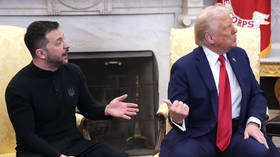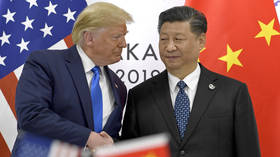A new morality for show business, or Communist virtue-signaling? China demands celebs be humble & set a good example
Chinese stars must steer clear of money-obsessed western celebrity culture, the country’s Communist Party has reminded them, extolling the virtues of patriotism and morality after publicly chastising several big names.
Beijing’s most famous have gotten a stern talking-to by Communist Party bigwigs, told to “oppose the decadent ideas of money worship, hedonism and extreme individualism” during an entertainment industry symposium on Tuesday in Beijing, state media reported.
The event was attended by big-name celebrities, showbiz moguls, and high-ranking Party members, all of whom were reminded of their responsibility to heed social ethics, personal morality, and family values. They were to set a good example for their fans – and for Chinese people in general – by “consciously abandon[ing] vulgar and kitsch inferior tastes, and consciously oppos[ing]…decadent ideas.”
“It is our creators’ duty to do every work simply and unadornedly, and to pass positive energy silently to the audience,” director Zhang Yongxin said in a speech at the event.
While their language might carry a whiff of old-school thought reform – the polite term for ‘brainwashing’ – the Chinese government has contributed to overhauling the nation’s cultural image far beyond telling individual stars what to do and say.
Also on rt.com ‘Give him the Nobel!’ Twitter trolls cheer as Kim Jong-un calls K-pop a ‘vicious cancer’Beijing has recently enacted a raft of changes, from banning some reality television shows, kicking certain K-pop stars off social media, and ‘disappearing’ misbehaving celebrities from the internet. Among the disappeared were Chinese-Canadian pop star Kris Wu, arrested on sexual assault charges in August, and billionaire actress Zhao Wei, who was memory-holed for less clear reasons, apparently involving a major lawsuit last month. Fellow actress Zheng Shuang was also reportedly blacklisted for tax evasion, for which she was fined $46 million.
The three-month ‘disappearance’ of Alibaba founder Jack Ma has also been linked to this image-cleanup campaign, with the e-commerce tycoon accused of criticizing the Chinese banking system and trying to overhaul it with his newest venture, Ant Group.
The Chinese equivalent of Uber, called DiDi, was axed from app stores reportedly for seeking foreign investors. Meanwhile, blockbuster game developer Tencent was raked over the coals in state media for poisoning kids with “spiritual opium.”
Children’s video game use has been officially curtailed to a mere three hours a week, in an apparent self-own of the country’s wildly popular gaming sector. It’s all quite different from the familiar business-first drive that encourages corporations to think of their shareholders first, even if that means turning their customers into blank-eyed click-zombies.
While those in the West are quick to pounce on Beijing for deplatforming these artists and corporations for supposedly making China look bad, American social media platforms like Twitter and Facebook have repeatedly demonstrated their own willingness to make inconvenient content or entire accounts disappear in response to requests from friendly governments, and corporations those governments don’t like find themselves bereft of investors (or web infrastructure) pretty quick.
Moreover, unlike China’s state-owned social media outfits, Facebook, Google, and the like are at least nominally independent corporations, raising troubling First Amendment questions about their relationships with Washington.
It’s also difficult to imagine any of the major western tech platforms voluntarily taking a step that would cost them money – China’s moves against its own Big Tech sector, for example, have supposedly wiped $1.2 trillion in value off the market. Meanwhile, the country has demanded an improvement in public school performance and banned private tutoring, also promising to stabilize housing prices in order to make home-ownership affordable for young people – an issue likely to hit home with the millions of young Americans for whom such ‘luxuries’ are hopelessly out of reach.
Think your friends would be interested? Share this story!














